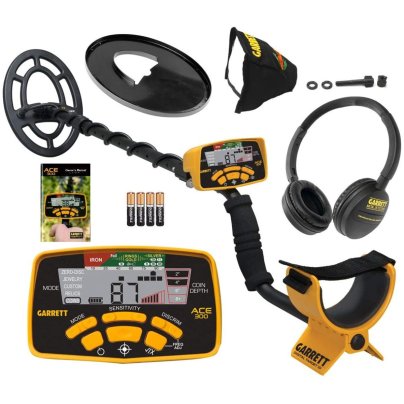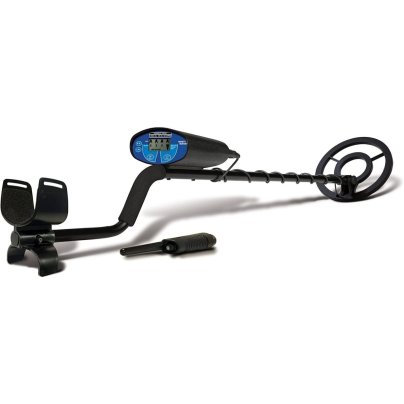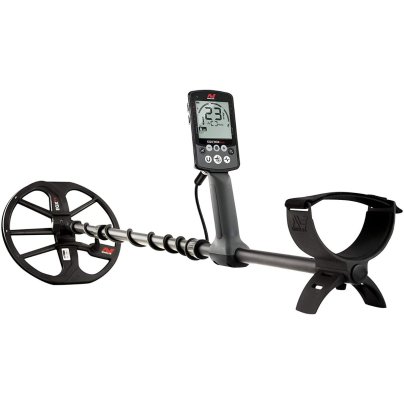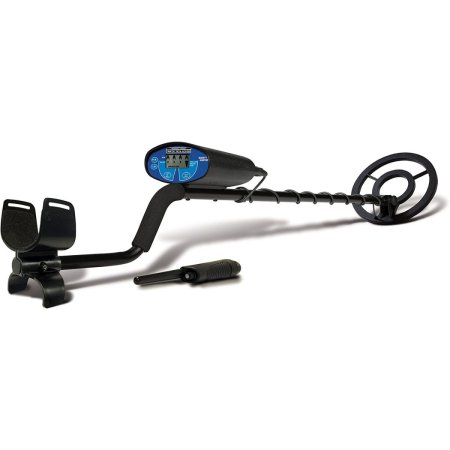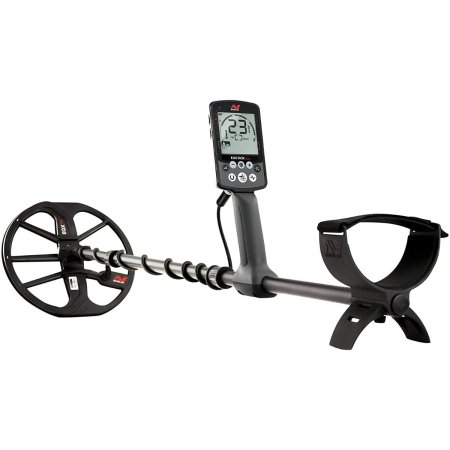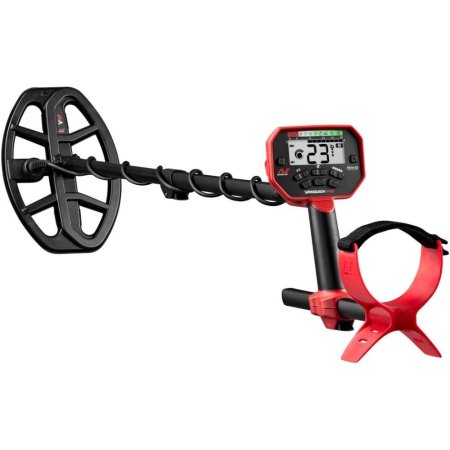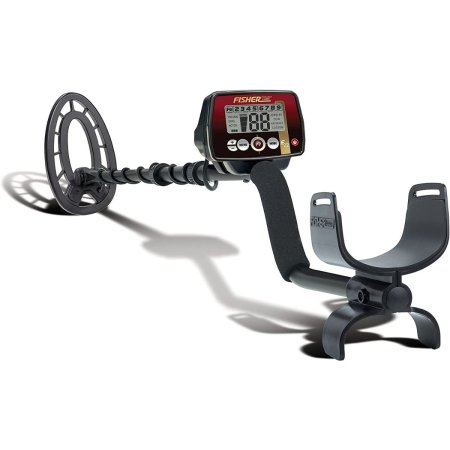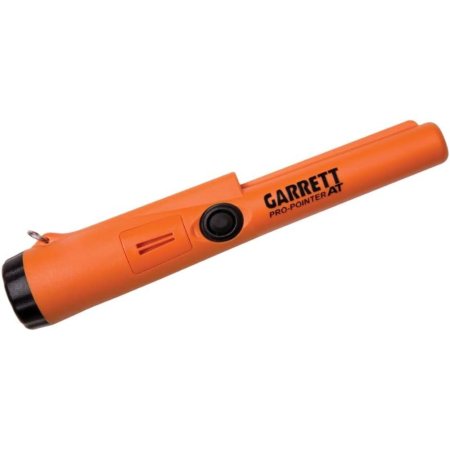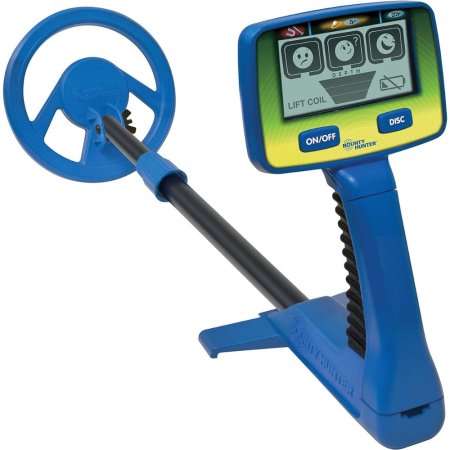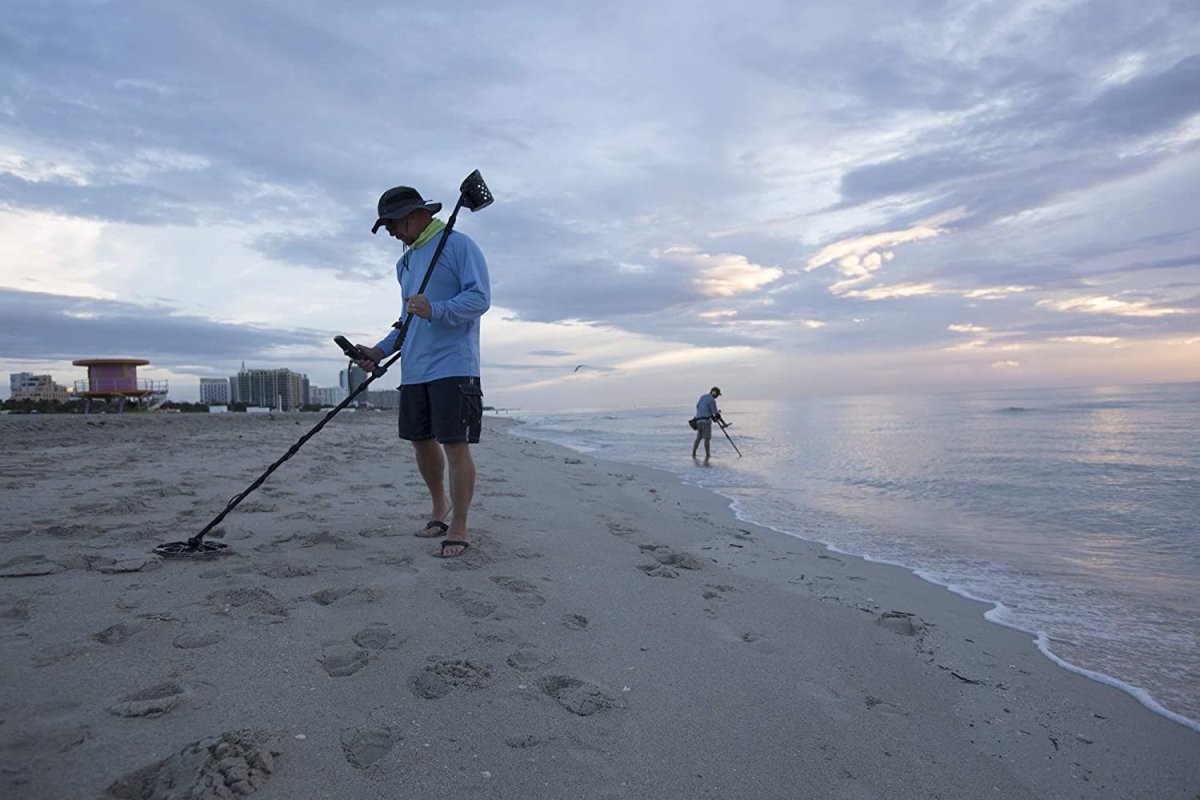
We may earn revenue from the products available on this page and participate in affiliate programs. Learn More ›
Dreaming of finding coins, jewelry, relics, and other buried treasures? Metal detecting is a fun hobby for folks of all ages that may have a great financial payoff. And luckily there are plenty of metal detectors on the market that are relatively inexpensive and also easy to use for people just starting out. These devices can help you search for metal items in various locations, including shorelines, fields, and parks.
Shopping for the best entry-level metal detector online, however, can quickly become overwhelming since there are so many options available. Where to begin? We spoke to Kevin Erickson, co-owner of MetalDetector.com based out of Southborough, Massachusetts, who explained that ease of use is one of the most important features someone should look for in a first metal detector. “For beginners venturing into the world of metal detecting, choosing the right equipment can make a world of difference in their overall experience,” Erickson says. “Embark on a metal detecting journey with a user-friendly detector that features an intuitive interface and simple operation. Avoid models with overwhelming controls and complex settings that might hinder your progress.”
Keep reading for tips on choosing the best option, and explore our curated picks for some of the best metal detectors for beginners.
- BEST OVERALL: Garrett Ace 300 Metal Detector
- BEST BANG FOR THE BUCK: Bounty Hunter Quick Silver Metal Detector
- UPGRADE PICK: Minelab Equinox 600 Metal Detector
- BEST EASE OF USE: Minelab Vanquish 440 Metal Detector
- BEST WEATHERPROOF: Fisher F22 Weatherproof All-Purpose Metal Detector
- BEST UNDERWATER: Garrett Pro-Pointer AT Metal Detector
- BEST FOR KIDS: Bounty Hunter Junior T.I.D. Metal Detector

How We Chose the Best Metal Detectors for Beginners
Years of experience covering electronics as well as extensive product research went into creating our guide. We explored more than 30 metal detector options and weighed a number of practical considerations before making our recommendations.
- Weight: A lightweight design is a top priority for most users, so we omitted any models that weighed more than 3 pounds.
- Discrimination features: We prioritized models that offer advanced discrimination features so users can specify the type of metals they’re hunting for.
- Price: Metal detectors are available at a wide range of price points. Aside from our Upgrade Pick, we ensured that all of our recommended products were under $300 in order to be suitable for beginners.
Our Top Picks
Coming right up are our top picks for some of the best beginner metal detectors for people intrigued by this fun pursuit. We selected these products because of their quality construction, excellent performance, and top-notch ease of use. Whether looking for a good yet inexpensive metal detector or a more sophisticated model, shoppers are likely to find the best option among our picks.
Best Overall
Garrett Ace 300 Metal Detector
Pros
- Adjustable length and lightweight design make it suitable for short and tall users as well as those with various degrees of physical strength
- Multiple search modes are available to make it easier to detect certain items
- Numeric Digital Target ID system allows users to identify a metal’s conductivity to further narrow down item identification
Cons
- Display screen is on the small side, and some users may find it hard to view details
Product Specs
- Weight: 2.8 pounds
- Maximum search depth: 8 inches
- Frequency: 8 kHz (adjustable)
The Garrett Ace 300 metal detector is an intermediate-level model that’s suitable for beginners and more experienced users alike. This model features five search modes—Zero (no discrimination), Jewelry, Custom, Relics, and Coins—allowing users to customize what they want to detect. Plus, a valuable pinpointing feature helps narrow down the location of buried treasure.
Additionally, this metal detector offers a numerical Digital Target ID system that ranges from 0 to 99, with high-conductivity metals providing higher readings and low-conductivity metals indicating lower readings. It operates at a frequency of 8 kilohertz (kHz), which is slightly higher than many entry-level models on the market and allows for minor frequency adjustments as needed.
This model is lightweight at just 2.8 pounds, so it’s suitable for younger users and those with mobility issues. The search coil is submersible, so it can be used in shallow areas of water. The length is adjustable from 42 to 51 inches, making this model a good choice for both short and tall users.
Get the Garrett Ace 300 metal detector for beginners at Amazon, Cabela’s, or Bass Pro Shops.
Best Bang for the Buck
Bounty Hunter Quick Silver Metal Detector
Pros
- Affordable but still feature packed, with adjustable settings for a reasonable price
- Features automatic ground balancing to help lower the chance of false signals
- Push-button discrimination makes it easy to eliminate certain items from a search
Cons
- Lacks a pinpointing feature; users required to pinpoint objects manually
Product Specs
- Weight: 2.8 pounds
- Maximum search depth: 6.5 inches
- Frequency: 6.6 kHz
Those looking to try their hand at metal detecting without making a major financial investment may appreciate the affordable price of the Bounty Hunter Quick Silver metal detector. This simple device has straightforward controls for excellent ease of use, so it can be a great budget metal detector. It offers automatic ground balancing, ensuring that the earth’s natural metals don’t interfere with the detection process. It operates at a low frequency of 6.6 kHz, so it is ideal for discovering metals buried at deeper levels. The depth control is adjustable, and three-tone audio identification alerts users to different types of finds.
The search coil is waterproof, allowing users to explore shallow pools and coastlines without risk of damaging the device. This metal detector also offers length adjustment, allowing for optimal comfort for users of varying heights. A padded armrest makes long hours of searching even more comfortable.
Get the Bounty Hunter metal detectorfor beginners at Amazon.
Upgrade Pick
Minelab Equinox 600 Metal Detector
Pros
- Fully waterproof design; made for all weather conditions and submersible up to 10 feet
- Multi-IQ technology allows the detector to simultaneously use several frequencies at once to improve target sensitivity
- User-friendly enough for beginners but with excellent features to grow with hobbyists’ skill level
Cons
- Expensive; may be out of budget for many beginner detectorists
Product Specs
- Weight: 2.96 pounds
- Maximum search depth: Over 8 inches
- Frequency: 4, 5, 10, 15 kHz (adjustable)
Those looking to invest in a high-quality model may appreciate the sophistication of the Minelab Equinox 600 metal detector. It’s an advanced, powerful model that’s still easy enough for beginners to use and offers all the bells and whistles most folks would want from a metal detector, as well as some handy extras.
This Minelab can detect at depths over 8 inches, which means that it’s more powerful than most basic models. What really sets it apart, however, is that it’s fully submersible in up to 10 feet of water, allowing for underwater exploration that goes beyond the shoreline.
There are three detection modes—Park, Field, and Beach—each of which is ideal for exploring that particular environment. This model also offers adjustable frequencies from 4 to 15 kHz, so it is suitable for both deep detections and finding smaller items like gold. The Multi frequency uses Multi-IQ technology, employing simultaneous frequencies to detect more items. Users can also choose from single frequencies, and the adjustable range can make this a perfect gold metal detector for beginners. An accurate target identification system allows users to bypass nails and bottle caps in favor of more high-value metals.
Get the Minelab Equinox 600 metal detectorfor beginners at Amazon, Walmart, Dick’s Sporting Goods, or Cabela’s.
Best Ease of Use
Minelab Vanquish 440 Metal Detector
Pros
- Operation is turn on and go for convenience: frequency and ground balance adjust automatically
- Multi-IQ technology employs multiple frequencies at once for a more efficient search
- Large and easy-to-read screen with user-friendly tactile buttons
Cons
- Some reviewers found the wired headphones uncomfortable and a bit of a hassle to use
Product Specs
- Weight: 2.6 pounds
- Maximum search depth: Over 8 inches
- Frequency: Multiple frequencies (not specified)
Packed with user-friendly features for both beginner and more experienced detectorists alike, the Minelab Vanquish 440 metal detector is both simple and powerful. Like the Minelab Equinox 600, this detector also has the brand’s Multi-IQ technology, using multiple frequencies at once to improve sensitivity. Once users have found a hidden treasure, they can employ the pinpoint mode to really narrow down its area.
A waterproof search coil makes it possible to use this detector in shallow water. To fine-tune exploration, there are four search modes: coin, relic, jewelry, and custom. A large and simple screen makes it easy to flip through controls where users can adjust sensitivity and volume settings and view information like the target identification number and its depth.
Get the Minelab Vanquish 440 metal detector for beginners at Amazon.
Best Weatherproof
Fisher F22 Weatherproof All-Purpose Metal Detector
Pros
- Lightweight design makes this metal detector easy to carry around
- Weatherproof and completely sealed to protect from rain and dirt
- Numeric Target ID display and 4-tone audio ID system help with item identification
Cons
- Only coil is waterproof; the rest of the unit is not submersible
Product Specs
- Weight: 2.3 pounds
- Maximum search depth: 9 inches
- Frequency: 7.69 kHz
Dedicated metal detectorists venture out in all kinds of weather, so it’s important to choose a model that can handle storms and other hazards. While it’s not rated for underwater use, the Fisher F22 metal detector is completely sealed and weatherproof, making it ideal for wet, windy, and dusty conditions. The coil itself is waterproof, but the rest of the device should not be submerged.
Setup is a breeze—simply turn it on and start detecting. Choose from four operation modes: Jewelry, Coins, Artifacts, and Custom. The target identification system is extremely precise, displaying a number between 1 and 99 to let users know if they’ve discovered iron, foil, nickels, gold, zinc coins, copper, or silver. A four-tone audio ID system lets users know what they’re about to uncover without even looking at the screen. A pinpoint feature further helps folks nail down where to dig for an item.
Get the Fisher metal detectorfor beginners at Amazon, Walmart, or Cabela’s.
Best Underwater
Garrett Pro-Pointer AT Metal Detector
Pros
- Designed for underwater use; bright orange color keeps it visible and it’s submersible up to 20 feet
- Very lightweight and easy to carry, even while underwater; weighs under 1 pound
- A built-in LED light and a scraping edge help to reach the target item
Cons
- A pinpointer; not ideal for searching large areas but useful for pinpointing a target or searching small spaces
Product Specs
- Weight: 0.41 pounds
- Maximum search depth: Not specified
- Frequency: 11.5 kHz
Underwater adventures can become even more exciting with the Garrett Pro-Pointer metal detector. This small metal detector is a pinpointer, which means it’s designed to make it faster and easier to zero in on the location of a target treasure. It’s often used in tandem with a larger metal detector, but since divers might not be able to carry both, this pointer may be an ideal solution. It’s submersible up to 20 feet.
The bright orange color helps prevent this detector from getting lost in the water. A built-in LED light helps illuminate the search area. This little detector also has a scraping edge to help sift through sand and soil for the target item. Users can choose from three sensitivity levels to help detect small targets.
Get the Garrett Pro-Pointer metal detector for beginners at Amazon, Bass Pro Shops, Cabela’s, or Garrett.
Best for Kids
Bounty Hunter Junior T.I.D. Metal Detector
Pros
- Very user-friendly and easy for kids to use right out of the box
- Ideal size and weight for children: weighs 1.5 pounds and has an adjustable length
- Simplified screen uses simple buttons and emoji display to help kids find items
Cons
- Coil is only water-resistant and not waterproof, so it can’t be submerged
Product Specs
- Weight: 1.5 pounds
- Maximum search depth: 5 inches
- Frequency: 6.6 kHz
A metal detector is one of the
who are interested in exploring a new hobby. Younger children ought to start with an appropriately sized metal detector, such as the Bounty Hunter Junior T.I.D., which is designed for explorers 6 years old and up. It weighs 1.5 pounds and has an adjustable length to grow with a child.
It’s very user-friendly, with a simple screen that uses emojis to help narrow down target finds. It also includes some extra detection features. Kids can choose from three target identification categories: iron, rings and other, and coins and valuables. Along with the discrimination control feature, this helps to eliminate unwanted items.
Get the Bounty Hunter metal detector for beginners at Amazon, Walmart, Target, or Dick’s Sporting Goods.
Jump to Our Top Picks
What to Consider When Choosing Metal Detectors for Beginners
While it’s easy to assume that all metal detectors offer similar performance, a number of factors affect their functionality. Features like weight, operating frequency, ground balance, search modes, and weatherproofing can make one a better fit for a user’s needs than another option. Keep reading to learn about these important features to consider when shopping for the best entry-level metal detector.
Weight
Metal detecting requires hours out in the field—or on the beach—so choosing a lightweight model can be helpful for users who prefer not to haul a heavy piece of equipment around all day. Children and those with back or shoulder issues may particularly appreciate a lightweight model.
Generally speaking, higher-end metal detectors tend to weigh more, while entry-level models are designed to be light and easy to carry. For the most comfortable searching experience, look for a metal detector that weighs less than 5 pounds. Also consider a model that offers height adjustment, which increases ease of use for both shorter and taller users.
Operating Frequency
A key consideration when choosing a metal detector is its frequency, which is the number of times per second that the signal is sent to the receiver. The lower the frequency, the easier it is to find objects buried deep in the ground. High frequency metal detectors are ideal for finding smaller objects that are closer to the surface.
Most beginner metal detectors are all-purpose, offering a low to medium frequency. When searching for gold, however, higher frequencies are used in order to isolate gold from other more common metals.
Ground Balance
One of the issues that people encounter when using a metal detector is that the earth itself contains trace amounts of metals that can set the device off even if there’s nothing to be found. Metal detectors with a ground balance feature ignore these natural metals to avoid false readings.
There are several ways in which metal detectors perform ground balancing. Those with an automatic ground balance feature don’t require any user intervention, whereas those with manual ground balancing must be adjusted based on the object the user is seeking. Typically, entry-level metal detectors offer automatic ground balancing for optimal ease of use.
Discrimination Features and Search Modes
A key feature of more advanced metal detectors is target identification. More advanced models not only alert the user when a metal is detected but also take it a step further by actually identifying what type of object has been found.
Some models allow users to set specific search modes to look for coins, relics, jewelry, and more. Also called “target discrimination,” it’s another important feature that Erickson explains is important for a beginner metal detector. “The ability to differentiate between desirable targets, like coins and jewelry, and unwanted objects, like pull tabs and bottle caps, is essential for efficient searching,” he says. “Opt for a detector with adjustable discrimination settings to tailor your search based on the type of treasures you seek.”
A detector may indicate the type of object found with auditory or visual alerts. Some use an auditory system that generally makes a louder, high-pitched sound when a more valuable object is found and a quieter, more low-pitched sound when a low-value object is detected.
More advanced models have a screen that displays an image indicating the type of object that has been detected. There are also models that have different search modes for types of terrain, allowing users to identify whether they’re working in a field, in a park, or at the beach.
Some metal detectors have pinpointing features, which can make searches even more efficient. “Once you’ve detected a potential target, pinpointing accuracy becomes crucial for precise excavation,” Erickson says. “Look for a detector with a dedicated pinpointing mode and a sensitive probe that can pinpoint the exact location of buried objects, minimizing digging and maximizing your finds.”
Waterproof/Weatherproof
Since metal detectors are designed to be used outdoors, it’s important that they have some level of weatherproofing. Most models are water-resistant, allowing for them to be used in rainy weather or at the beach without users worrying about them incurring damage.
Some models, however, are designed to be fully waterproof so they can be used underwater. The most advanced waterproof models are even capable of exploring the ocean’s depths while scuba diving. Most waterproof entry-level models simply have a waterproof search coil, allowing users to search in shallow water.
Be sure to verify the manufacturer’s specifications before using a metal detector in water to avoid damaging the device.
FAQs
The guide above offers lots of info on the best metal detectors for beginners, but those with other questions will want to read on. Below, we offer concise answers to some of the most common questions about metal detectors.
Q. What equipment do I need for metal detecting?
A metal detector is the only thing you need to get started with metal detecting.
Q. Which metal detector is the easiest to use?
We recommend the Minelab Vanquish 440 metal detector for optimal ease of use because of its intuitive interface and clear user controls.
Q. Are cheap metal detectors any good?
Prices for metal detectors vary widely, from under $100 to more than $2,000. Higher-end models tend to offer better performance, but inexpensive ones are a great place to start for beginners who are new to the hobby.
Q. Can anyone use a metal detector?
Most metal detectors for beginners are incredibly easy to use. However, newcomers to the hobby may benefit from reaching out to a local club or organization to shadow an experienced detector on a hunt to learn how to get the most out of the tool.
Q. Which metal detector can I use in the water?
Before using a metal detector in the water, it’s important to verify its waterproof rating. While some metal detectors only have a waterproof search coil, others can be fully submerged in water without incurring damage.
